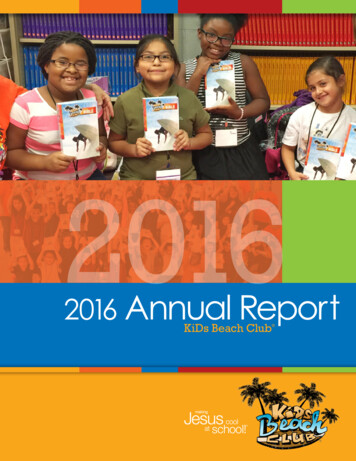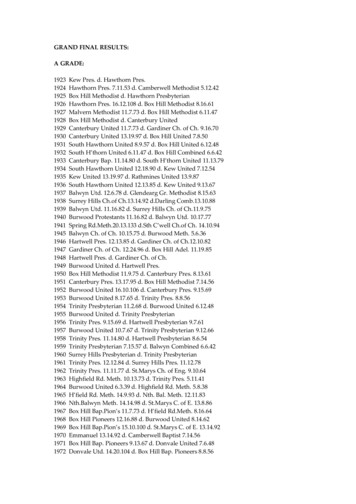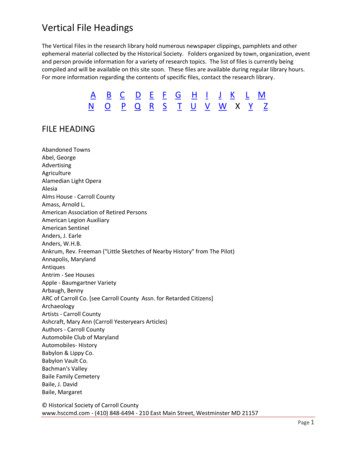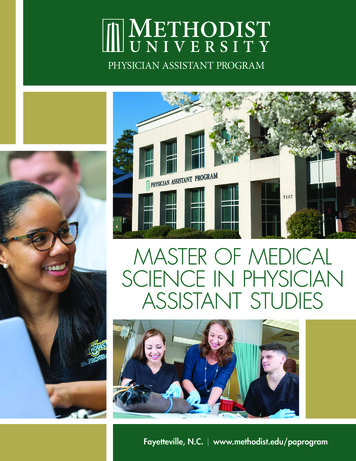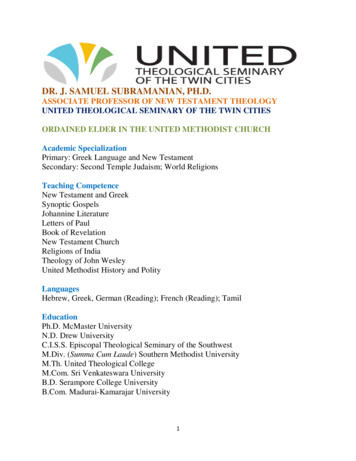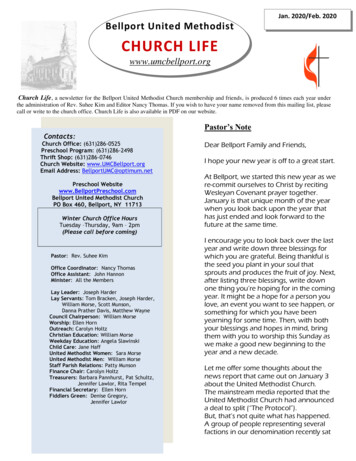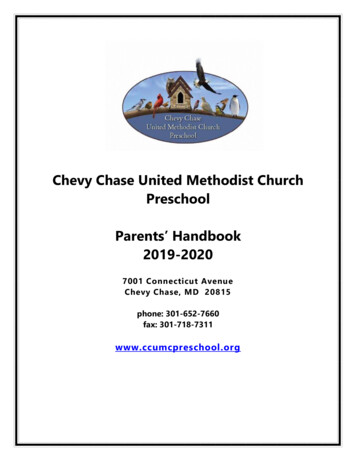
Transcription
Chevy Chase United Methodist ChurchPreschoolParents’ Handbook2019-20207001 Connecticut AvenueChevy Chase, MD 20815phone: 301-652-7660fax: 301-718-7311www.ccumcpreschool.org
Welcome toChevy Chase United Methodist Church Preschool (CCUMCP)This handbook describes our program and the philosophy that shapes our daily activities. We hope it willbe helpful to you in your interactions with the children and the staff, and that your experiences here willbe rewarding for both you and your child.Please note that all policies and procedures outlined in this handbook are subject to change by thepreschool’s Advisory Council during the course of the school year. Families will be notified in writing whenchanges occur.TABLE OF CONTENTSYou may select any of the links below to jump to the corresponding section of the handbook, orscroll past these links to browseAfternoon AdventureImagination StageApplication and AdmissionInsuranceArrivalMission StatementAsbestos Management PlanNewslettersBirthdaysOpen HouseBuilding SecurityOrganizationCalendarParent Education & ResourcesClass Size & Staff/Child RatioParent ParticipationClothingParent Participation Opt-outConfidentialityParkingConsultantsPhilosophy and Curriculum ObjectivesDevelopmental ScreeningPhotographsDiscipline PolicyProgram SummaryDismissalPlacement & ProgressionEarly Bird - early morning drop-off programRegistrationEmergency Closing PolicyRoom ParentsEmergency PreparednessSafe Sanctuaries PolicyExtended Day ProgramsScreen TimeFamily Work AssignmentSiblingsFeesSnack and LunchField TripsSpanish ImmersionFinancial AidStaffFitness and Sports ProgramTransportationFrench ImmersionWithdrawalHealth and Safety
Mission StatementAs a school community within a Christian community,we are committed to nurturing childrento develop into the fullness of their potentialand to increasing their awareness of and compassion forthe world around them.ORGANIZATIONThe Chevy Chase United Methodist Church Preschool was established in 1967. It is a non-profit, selfsupporting program under the auspices of the Chevy Chase United Methodist Church. Ultimateresponsibility for the program is vested in the Chevy Chase United Methodist Church ChargeConference. The Conference oversees the Church Council, which considers proposals from thepreschool’s Advisory Council and evaluates the state of the Preschool. The preschool’s AdvisoryCouncil sets policy, establishes all fees and employs the staff, which includes the Director,Administrator, teachers and classroom assistants. The preschool’s Advisory Council is made up ofmembers of the Church who have children enrolled in the program, the two administrators, a staffrepresentative, and, possibly, additional preschool parents who are not members of the Church.Parents play an active role in the school - participating in their child’s classroom, driving on field trips,helping with class and school events, working on fundraisers, and serving on the Advisory Council.Monthly Council meetings include a “Parent Forum” where families may bring ideas or concerns to theCouncil. A parent orientation meeting is held at the beginning of each school year to outline the programand policies, and to familiarize parents with daily classroom routines.CCUMC Preschool does not discriminate on the basis of race, color, national or ethnic origin, religion,or sexual orientation in the administration of its educational and/or admissions policies, scholarshipand loan programs, and other school-administered programs. This non-discriminatory policy pertainsto all applicants and students, and thusly affords them all the rights, privileges, programs, andactivities generally made available within CCUMC Preschool. Moreover, CCUMC Preschool does notdiscriminate on the basis of race, color, national or ethnic origin, religion, gender, sexual orientationor age in the employment or retainment of staff.CCUMC Preschool operates under a Certificate of Approval from the Maryland State Department ofEducation. Please read their pamphlet, “A Parent’s Guide to Regulated Care” for more information. Anycomplaints about CCUMC Preschool that involve any threat to the health, safety or welfare of a childshould be immediately registered with your regional Office of Child Care and, in certain circumstances,with the Child Protective Services division of your local department of social services. LOCATE: ChildCare Referral Specialists can be reached by telephone at 877-261-0060 and can provide you with theCCUMCP Parents’ HandbookPage 3
telephone numbers of the office nearest you.PHILOSOPHY AND CURRICULUM OBJECTIVESThe most important thing children should develop in their early years is self-confidence and a belief inthe essential goodness of the world around them. Our program strives to reinforce the confidence andtrust of children in themselves and the people they meet in an environment away from home. A “healthyself-concept" is an immeasurable and vaguely defined goal, but that does not lessen its importance.Respect for the child as he or she is and for what he or she wishes to become precedes all learning and isintrinsically entwined in it. Warm and loving relationships come first and are the basis for all the learningexperiences that the program tries to provide.We believe each child needs to recognize his or her individuality as valuable and unique. Confidence andtrust in this individuality should be reinforced within both the family and the preschool environment. Weare committed to helping each child develop a sense of self-worth, a respect for his or her needs andrights as an individual, as well as for the needs and rights of others. In this vein, we work intentionally topromote the development of good manners and positive virtues. The entire school utilizes a virtuescurriculum that emphasizes one virtue per month. Teachers help children develop an understanding ofthese virtues through the use of books, classroom activities, and when appropriate, community serviceactivities.We seek to expose children to community life through field trips, community service projects andclassroom units so that they are able to see themselves in relation to families, communities and all ofGod’s world. By providing them the opportunity to interact with role models (e.g., firefighters, dentists,recycling truck operators) from the larger community, we help them to develop an understanding of thepositive impact that an individual can have on the world around him or her. By then giving childrenhands-on opportunities to partake in community service projects, children develop a sense of their ownability to effect positive change in their community even as a young child.We provide guidance and encouragement to each child with a healthy, supportive, and acceptingatmosphere - one that cultivates enthusiasm and discovery. We try to stimulate within each child thedesire to learn, to observe and to explore, in order to gain an understanding of the world. We providehands-on experiences and activities appropriate to each child's interest and developmental level. Wehope to foster positive attitudes toward the school experience and lay an educational foundation thatwill support learning in primary school and beyond.We believe children need to explore the world, observing, examining and questioning things previouslyunknown. Each child is encouraged to develop his or her own interests and explore his or her own ideasin an atmosphere where there is freedom to learn. We encourage meaningful communication andimaginative self-expression. Through storytelling, reading, circle conversation, sharing, dramatic play, andindividual conversation with peers, teachers, participating parents and visitors, our program contributesto the child's development of listening and speaking skills, critical and creative thinking, visual andauditory skills and hand-eye coordination. Other language arts objectives are the fostering of anCCUMCP Parents’ HandbookPage 4
appreciation of the spoken and written word, of the joys of good literature, and of a rich vocabulary.The preschool also strives to expose children to the languages and cultures of foreign countries. Webelieve that children who learn another language are developing increased problem solving skills,creativity and cognitive flexibility in addition to developing a more global perspective of the world.Our program attempts to help each child develop the skills and understanding needed for quantitativethinking and to make the transition from perception to problem solving. By the time each child hascompleted the pre-K program our goals in mathematics are to establish the meaning of number concepts through actual usage; to help each child learn to organize things into groups, count in sequenceand recognize the numerals from 1 to 20; and to understand the use of shapes, patterns, measurementsand designs in concrete and representational form.We believe that a child will gain an understanding and knowledge of basic scientific concepts bestthrough observation and exploration. Therefore, we encourage a scientific attitude through questions,discussion, simple investigation and evaluation of information. Occasionally pets are brought into theclassroom, encouraging children to observe and help with family pets. Neighborhood walks and fieldtrips to nature centers help the child develop an appreciation and respect for all living things.Children are also encouraged to express their thoughts, ideas and feelings through the use of artmaterials. They paint with brushes, sponges, string, marbles, and fingers. They also use crayons, glue,scissors, chalk, clay, and much more. In these activities, a child will explore the use of materials anddevelop confidence in the creative process. Each child will also learn to recognize colors, shapes, line,form, texture and design, and to develop the fine motor skills needed for writing and drawing.A special session each week for music and rhythms, taught by a music specialist, provides the childrenwith an opportunity to respond to ideas and feelings expressed through music.We strive to help each child learn to control and enjoy his/her body, to learn and use safety concepts,develop motor skills and a sense of spatial awareness, balance and coordination. Weekly fitness andsports sessions are included in the program during the winter months by Jump Bunch. Outdooractivity on playgrounds with climbing apparatus, swings and riding toys is scheduled each day.The pre-K classes rotate between their classrooms once a month to participate in specially preparedactivities (e.g. a science experiment, language arts, French instruction or math activity) beginning inJanuary. In this way, each child benefits from the expertise of each teacher and classroom set-up.Beginning in December with the building of gingerbread houses, the pre-K classes gather togetheronce a month to participate in a joint activity. Activities include making sandwiches for the needy (amonthly community service project), making gingerbread houses in December, and parading for theChinese New Year.Teachers work together in teams, meeting monthly to plan curriculum and special events. This helpsensure that each class is exposed to the same concepts and ideas, although the approach in individualCCUMCP Parents’ HandbookPage 5
classrooms is not identical because of the differences in class dynamics, maturity levels of students andindividual teacher preference.The curriculum prepares students to master the skills that are outlined in the Montgomery CountyPublic School System’s curriculum standards. To view the standards for Montgomery County’skindergarten, please go /curriculum/integrated/EIC-Framework.pdf Thepreschool also uses the Handwriting Without Tears curriculum for developing children’s coloring,drawing, counting and handwriting readiness. The method can be viewed at www.hwtears.comIndividual parent-teacher conferences are held during the year at which time classroom activities and theprogress of each child is discussed. At other times throughout the school year, parents are encouragedto discuss any concerns they may have with their child's teacher and/or with the Director.SPIRITUALITYThe United Methodist Church is a Christian church based on biblical faith. It strives to be an inclusivesociety without regard to ethnic origin, economic condition, gender, age or handicapping conditions. Itasserts that all who are baptized are ministers to Jesus Christ and affirms global mission and connectionwith other denominations in spirit and cooperation. In this ecumenical spirit, the preschool also strives toaffirm God’s presence in other faith traditions.We affirm a child’s spirituality and believe children should be aware of God’s presence in our lives. Thechildren say a blessing together before snack each day, and participate in three brief non-denominationalchurch services in the sanctuary at Thanksgiving, Christmas and Easter.PROGRAM SUMMARY2019-2020 School YearMorning Preschool ClassesCCUMCP provides a morning preschool program that maintains a certificate of approval from theMaryland State Board of Education. The program includes classes for children from two to five years ofage. A range of classes is offered for each age-group, from two to five mornings a week. All morningpreschool classes meet for three hours.Class Ages and SchedulesMid-year 2s (January-June) For children who turn 2 between September 1 and December 31Two Days-Tues/Thurs,9:00am to 12:00pmClass size – 10Two-year-old classes – For children who turn 2 prior to September 1Two Days-Tues/Thurs (2 classes)CCUMCP Parents’ HandbookPage 6
Three Days – Mon/Wed/Fri (2 classes)Five Days – Mon-Fri (1 class)9:00am to 12:00pmClass size – 10Three-year-old classes – For children who turn 3 prior to September 1Three days - Mon/Wed/Fri (1 class)Five Days-Mon –Fri (3 classes)9:00am to 12:00pmClass size – 12Pre-K Classes - For children who turn 4 prior to September 1 (we also have a class designated forchildren who have already turned 5 and need one more year of pre-k before moving on toKindergarten)Five Days-Mon – Fri (3 classes)9:00am to 12:00pmClass size - 16Extended Day ProgramsIt is our belief that the extended day programs, with the exception of the Early Bird program, provideenrichment and an opportunity to acclimate children to a longer day before starting kindergarten. Toparticipate in afternoon activities children must have celebrated their third birthday and must be pottytrained (no diapers or pull-ups). There is no age requirement or potty training requirement for the EarlyBird program.Early Bird – 8:30am to 9:00am, Monday - FridayIn this early morning drop-off program, children begin the day at 8:30am in the Early Bird classroom.They are escorted to their regular classroom at 9:00am. The program is available to all childrenenrolled in the preschool. Advance booking is not required.Afternoon Adventure – 12:00pm to 2:30pm, Monday – FridayThis afternoon enrichment program is available to children enrolled in a three year-old or pre-K class,and to children in the two’s program who have celebrated their third birthday. Children are escortedfrom their morning classroom to the Afternoon Adventure classroom at 12:10pm. A teacher and assistantprovide a variety of activities including music, science, art and crafts. The schedule includes lunch onarrival and outdoor play. The program commences the second week of school and continues until thelast Thursday of school. Afternoon Adventure is not held the day before Christmas break. AfternoonAdventure is available on a drop-in basis if there is space available.Spanish Immersion – 12:00pm to 2:30pm, Thursday, FridayChildren remain at school to eat their lunch then participate in a Spanish language immersionprogram. A teacher and assistant provide a variety of activities in Spanish in order to facilitate thelearning of the language, providing multiple opportunities for children to practice the language skills.The class is available to children who have had their 3rd birthday and are toilet trained. . The programCCUMCP Parents’ HandbookPage 7
commences the second week of school and continues until the last Thursday of school. SpanishImmersion is not held the Friday before Christmas break. Spanish Immersion is not available on adrop-in basis.French Immersion – 12:00pm to 2:30pm, MondayChildren remain at school to eat their lunch then participate in a French language immersionprogram. A teacher and assistant provide a variety of activities in French in order to facilitate thelearning of the language, providing multiple opportunities for children to practice the language skills.The class is available to children who have had their third birthday and are potty trained. The programcommences the second week of school and continues until the last Monday of school. FrenchImmersion is not available on a drop-in basis.Mini-Sessions – 12:00pm to 1:30 or 2:30pm, Offered at various times throughout the yearThese are special 6-8 week-long classes offered throughout the school year which focus on a particulartopic such as cooking, art, music, soccer, basketball, gymnastics, and yoga. A schedule of these classesfor the school year is available from the preschool office or on the preschool website. Children remain atschool to eat their lunch then participate in activities related to the topic of the mini-session. Some of themini-sessions are stand-alone classes and some are embedded within Afternoon Adventure sessions.Each mini-session is run by a teacher and an assistant teacher. These classes are available to children whohave had their third birthday and are potty trained with the exception of the mini-sessions developedspecifically for the two year olds who need not be potty trained. Mini-sessions are not available on adrop-in basis.STAFFEach class is staffed by a teacher and an assistant. All teachers and assistants hold the credentialsrequired by the Montgomery County Office of Child Care (OCC). In addition, all staff members receivesubstantial continuing education training in early childhood education each year. All staff membersmaintain current certificates in First Aid and CPR.Class size and child/staff ratioThe preschool ensures a high standard of individual attention for each child by maintaining small classsizes with low staff/child ratios. Following are class sizes:Two year-olds (Buntings, Chickadees, Hummingbirds, Sparrows, Starlings and Wrens): ten childrenThree year-olds (Blue Jays, Cardinals, Doves, Orioles and Robins): twelve childrenPre-K (Eagles, Owls, and Penguins): sixteen childrenAfternoon Adventure: sixteen children (Pre-K class) and fourteen (3’s class)Spanish Immersion: fourteen childrenFrench Immersion: fourteen children(Note: On rare occasions class sizes may be increased by one student.)All morning classes and extended day programs are staffed by a teacher and teacher's assistant. Duringthe morning program, there is parent participation in the classroom scheduled on average approximatelyCCUMCP Parents’ HandbookPage 8
once a week.APPLICATION AND ADMISSIONSchool ToursMonthly tours of the preschool for prospective parents begin in October. Parents attend an informationsession then tour the school, often led by preschool parents, to observe classes in action.RegistrationRegistration for all classes, both morning and afternoon, is done online through the parent portal whichmay be accessed here. The user id and password for the parent portal is created by the parent. Fortechnical issues or password support, parents should contact the Director or Administrator. A user’sguide for the parent portal may by found under the “Communication” tile on the portal.The deadline for registration for morning preschool classes for the upcoming school year is the lastbusiness day in January. Priority is given to full members of Chevy Chase United Methodist Church (fullmembership by December 1 of the preceding year), Preschool Advisory Council board members,children currently enrolled in the program and their siblings, and to alumni families. Spaces remaining inthe program after the above have been registered are assigned on a lottery basis in early February. Waitlists, assembled by children's birth dates and gender, are maintained for classes that are fully enrolled.These wait lists will be dissolved on February 1, 2020, and spaces will not be filled after that time. Namesare not carried over to the following school year.Registration for the extended day programs (Afternoon Adventure, Spanish Immersion and FrenchImmersion) opens August 1. Priority registration for Afternoon Adventure, Spanish Immersion and FrenchImmersion is given to children enrolled in a pre-K class. Only children who have been enrolled in amorning preschool class whose March tuition deposit has been paid and who are current with fees forthe current school year may participate in the registration process.Children may be registered to attend Afternoon Adventure on a regular basis for one to five days aweek. Registration is for the entire year and children will remain registered, and fees charged, until theoffice is notified in writing. Children may attend the programs on a drop-in basis, provided there is spaceavailable. There is no drop-in option for the Spanish Immersion and French Immersion classes.Placement and ProgressionEnrollment cut-off birth dates for the 2019-20 school year are as follows:Pre-K (Owls, Eagles & Penguins): four years by September 1, 2019Three year-olds (Blue Jays, Cardinals, Doves, Orioles and Robins): three years by September 1, 2019Two year-olds (Buntings, Chickadees, Sparrows, Starlings and Wrens): two years by September 1, 2019Mid-year two year-olds (Hummingbirds): two years between September 1, 2019 and December 31,2019Afternoon Enrichment Programs: Three years and up.It is not necessary for a child to be toilet-trained to enter the morning preschool program. However,CCUMCP Parents’ HandbookPage 9
children enrolled in afternoon enrichment programs may not wear diapers or pull-ups.Class placement is based on the child's birth date and the availability of openings in classes meeting onthe days selected by the parent. A balance of boys and girls is sought in each class. Because we havesuch a strong team of teachers at CCUMCP, we are confident that each child will thrive in any class inwhich he/she is placed. We will not, therefore, accept requests for particular teachers. Children will beplaced according to their age and gender in order to attain a balanced group. Whenever possible,children are placed with a friend.Progression of children within the program is based on the child's birth date. Any diversion from agegrouping will be on the recommendation of the classroom teacher to the Director after at least six weeksof the child's classroom participation.WithdrawalChildren are accepted for enrollment at CCUMC Preschool with the expectation that they will adapt tothe program. If a child has not settled in after a reasonable period of time, the Director may ask that thechild be withdrawn.A very clearly explained and reiterated framework of behavior is set forth by the teachers so that eachchild learns that the rights, works and individuality of others are to be respected and, if need be,protected. The Director will ask that a child be withdrawn if, after consultation with the teacher and thechild's parents and a three week trial period, the Director decides that the continued participation of thechild would be detrimental to the best interests of any or all concerned. Additionally, if parents fail tomeet parent participation commitments, scheduled payments, or pay other fees owed (such as late fees),their child can be excluded from the program.If a child is to be withdrawn from the program, parents must give 30 days written notice to theAdministrator. Once the program has begun, payments must be made through that 30-day period, andall scheduled parent participation days must be fulfilled. No refunds will be issued after April 1, 2020.For more information on fees in the case of dismissal or withdrawal, see "Fees".HEALTH AND SAFETYHealth and Safety Requirements for ChildrenA health inventory form and immunization certificate, provided by the preschool and signed by theparent and the child's physician, must be completed and returned to the preschool office before thechild may enter the program each year. The form includes a parental statement on the health status ofthe child and a physician's report on the child's health based on an examination within one year of thechild’s first day of school. The child’s immunization record must indicate that the child has received allrequired vaccinations. If there is deviation from the OCC mandated vaccination schedule, parents mustprovide a letter signed by the child’s physician stating the reasons for the deviation. The health inventoryalso must indicate that the child has had appropriate screening for lead poisoning.Daily general health rules are those of caution and common sense. Parents are reminded when they areCCUMCP Parents’ HandbookPage 10
deciding whether their child is well enough to come to school that symptoms of an illness that may becontagious are fever, listlessness or unexplained crying, diarrhea, nausea, rash, sore throat and runnynose. As each child will spend some time outdoors each day, a child who is not well enough to playoutside should not attend school. Children with a fever should not return to school until a minimum of24 hours after the fever has broken.During the course of the day, if a child becomes ill, he/she will be removed from the classroom and theparent requested to take the child home. If the parents are unable to be reached by phone, the personwhom the parent has designated as an emergency contact will be called.Parents should inform the office immediately if their child contracts a contagious illness. The office willalert the rest of the class so that parents may watch for symptoms in their child. In the case of anabsence from school of three days or more due to acute illness, a written statement from theparent or physician that the child may return to a regular schedule is required. In any case, parentsare requested to inform the office if their child will be absent from school.In the event of an epidemic, the preschool will comply with any decision to close schools by theMaryland Department of Education and/or the Department of Health and Human Services.Parents should ensure that both the teacher and the administrators are fully informed about any specificallergies their child has. HIPAA law requires that a child’s medical information remain confidential. Bysigning the Handbook Acknowledgement parents agree to allow the preschool to disclose pertinentmedical information concerning allergies and health concerns. This disclosure, the health alert notice,shall take the form of a list of children whom have health concerns, including allergies, to be posted inthe office and in each classroom. This list will include the child’s name, class name, allergen or healthconcern and medicines prescribed, if applicable. This alert will be visible to allow for any staff members,substitutes or co-oping parents to access the information quickly. If a child suffers from a serious nutallergy and the parent desires that the classroom be made “nut-free”, then it shall be made so. Popcorn,peanuts and grapes (unless cut) should not be sent to school, as they are a choking hazard.If a child is infected with lice, the child must stay home until the condition is treated and all lice and/ornits have been removed from the hair. A child who has been infected with head lice must be checked bythe preschool office before returning to the classroom. Routine checks of all children in the child’sclassroom (whole school if necessary) will be carried out following an outbreak of lice in the school.The school follows procedures for hand washing, diaper changing and otherwise limiting the spread ofinfection recommended by the Office of Child Care (OCC) of the Maryland Department of Education andthe Centers for Disease Control (CDC).The preschool staff cannot administer any medication to a child without written consent from the child'sparent or guardian. Forms for this purpose are available in the office.In accordance with the Maryland Department of Education all children who attend Preschool will need tohave developmental screenings conducted. Based upon their age at the time that school began, childrenwill be required to have up to 2 screenings per school year. Children birth- 36 months at the time thatschool began will be required to have 2 screenings while children 37 months and older will only berequired to have one screening per school year. The first screening for all children must be completedCCUMCP Parents’ HandbookPage 11
within 100 days of the beginning of the school year. For those children required to have a secondscreening it must be completed by June 1, 2020. Parents should consider this process as part of requireddocumentation in order for the child to attend our or any early childhood program in the State.Maryland has approved five different screening tools which may be used. Of these tools CCUMCPreschool has chosen the Ages and Stages Questionnaire. Parents will go to this site, ASQ online, toenter their child’s information and to complete the questionnaire which should not take any longer than15 minutes. This may be done on your home computer or any mobile device. Once you have submittedyour answers to the questionnaire, it will be scored automatically. The results of the screening will besent to the Preschool office.Parents must provide emergency contacts on the parent portal. The emergency contacts include thenames and contact information for a child’s doctor as well as information for adults authorized to pick upthe child in ca
Chevy Chase United Methodist Church Preschool Parents' Handbook 2019-2020 7001 Connecticut Avenue Chevy Chase, MD 20815 phone: 301-652-7660 fax: 301-718-7311 www.ccumcpreschool.org . Welcome to Chevy Chase United Methodist Church Preschool (CCUMCP)
